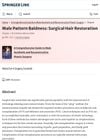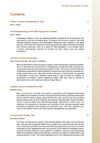TLDR Robotic hair transplantation with AI offers more reliable, precise, and efficient hair restoration.
Robotic hair transplantation, particularly using the ARTAS iX robot, offers significant advantages over manual Follicular Unit Extraction (FUE) techniques. These benefits include increased reliability, precision, efficiency, and reduced surgeon fatigue. The ARTAS iX robot, which combines artificial intelligence (AI) with human oversight, can autonomously make decisions, harvest grafts more quickly, selectively choose robust grafts, create precise sites, and minimize injury to existing hairs. This collaboration between AI and skilled human operators results in more natural and effective hair restoration outcomes.
 January 2024 in “Springer eBooks”
January 2024 in “Springer eBooks” Modern hair restoration techniques offer natural results with minimal complications.
 September 2023 in “Chinese Medical Journal”
September 2023 in “Chinese Medical Journal” Robotic surgical systems are being used more in plastic and reconstructive surgery due to their precision and control, improving patient outcomes and satisfaction, despite challenges like high costs.
 November 2023 in “Plastic and Reconstructive Surgery – Global Open”
November 2023 in “Plastic and Reconstructive Surgery – Global Open” Americans see hair transplants as valuable for treating hair loss and want them to be more affordable and tailored to each gender.
 38 citations
,
February 2016 in “Surgery Journal”
38 citations
,
February 2016 in “Surgery Journal” Facial plastic surgery has evolved to focus on less invasive techniques and innovative technologies for cosmetic and reconstructive procedures.
 November 2017 in “Dermatologic Clinics”
November 2017 in “Dermatologic Clinics” Men are increasingly interested in cosmetic treatments that enhance masculinity and address aging without downtime, with tailored approaches for different ethnicities and a focus on hair restoration and body contouring.





